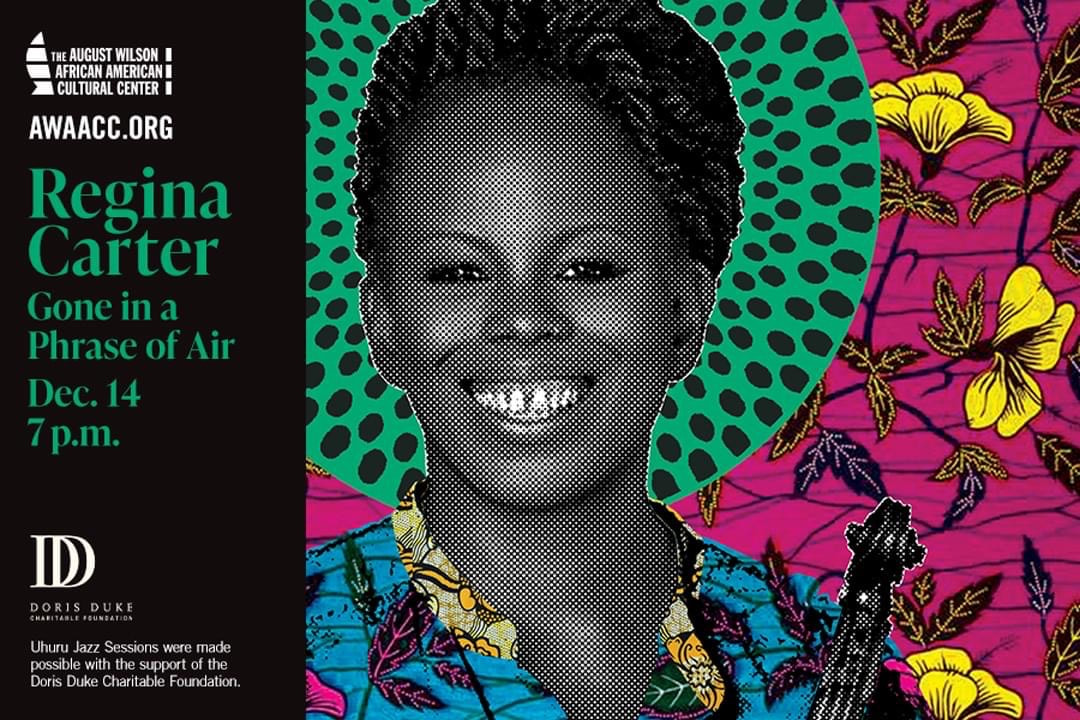Performs Her Multi-Media Work, Gone in a Phrase of Air,
at August Wilson African American Cultural Center’s
Uhuru Jazz Series
Wednesday, December 14, 7:00 pm and 9:00 pm
Carter’s Gone in a Phrase of Air tells the history of Black American communities of the early to mid-20th century that were erased and destroyed by the government’s 50’s and 60’s renewal programs that erected highways and buildings, while celebrating the artistry that emerged from those African-American enclaves across the country.
With a combination of original music, narration and visual media, Carter will be supported by drummer and husband Alvester Garnett, Carla Cook on vocals/spoken word and narration, pianist Xavier Davis and bassist Chris Lightcap. A pre-concert workshop will include a conversation on displacement, inviting community leaders as well as present and former neighborhood residents to take part in a conversation about their lost places, providing space for communities and generations to come together; to be heard, to reflect, to understand, to learn and to heal. In addition, Carter will lead a master class at the University of Pittsburgh.
Gone in a Phrase of Air began as a Lincoln Center commission for Carter about the rise and fall of Black Bottom, the legendary East Detroit Black enclave of the early to mid 20th century that was razed to make room for I-75. The title for the new project came from Detroit poet Leslie Reese, who assisted Carter by interviewing surviving residents of Black Bottom, turning their commentary into poetry. She uttered the phrase, “they just came through and destroyed them as if they never existed, gone in a phrase of air, as if they were never there.”
Reese’s words inspired Carter to expand her commission into her new work. “I think it’s a very important part of our history, just to know that over and over and over again, where we live, it seems that wherever Black people are doing well, some kind of way, someone comes in and … they kill a whole community of people,” Carter says on Gail Boyd’s Alternative Venues for Jazz Facebook page. “Or, if they come in and say this highway has got to go up, or this public building has to go up, they come in and do ‘development,’ … instead of developing an area so that people that are already living there can prosper and enjoy it, they push those people out. So that’s Gone in a Phrase of Air.”
Telling stories through music has been Carter’s gift since she was a child prodigy growing up in the Detroit. A graduate of that city’s famed Cass Tech High School, a mentee of trumpeter Marcus Belgrave and an alumna of Oakland University in Michigan, Carter played in the R&B group Brainstorm in the 70s and was a member of the all-female band Straight Ahead. She also has worked with a wide range of stars including pianists Danilo Perez and Kenny Barron, trumpeter Wynton Marsalis and vocalists Aretha Franklin and Mary J. Blige. But it was her album Paganini after a Dream, inspired by her historic 2002 trip to Genoa, Italy, where she became the first African-American and jazz musician to play the violin of the legendary classical virtuoso, Niccolo Paganini, that thrust her into the limelight. Her latest recording, Swing States: Harmony in the Battleground, dealt with the 2020 presidential election,COVID-19 and Black Lives Matter protests,
An esteemed educator, Carter is the Artistic Director of NJPAC’s Geri Allen Jazz Camp. She currently serves on the faculty of the Manhattan School of Music and New Jersey City University and is Artist-in-Residence at the Oakland University School of Music, Theatre, and Dance. With Gone in a Phrase of Air, Carter reminds us of the resiliency of those lost, but resilient Black enclaves that gave the world many artistic and cultural wonders.
Tickets are $28.00 and are available at www.awaacc.org or (412) 456-6666.
The August Wilson African American Cultural Center is a non-profit cultural organization located in Pittsburgh’s cultural district that generates artistic, educational, and community initiatives that advance the legacy of Pulitzer Prize-winning playwright August Wilson. One of the largest cultural centers in the country focused exclusively on the African American experience and the celebration of Black culture and the African diaspora, the non-profit organization welcomes more than 119,000 visitors locally and nationally. Through year-round programming across multiple genres, such as the annual Pittsburgh International Jazz Festival, Black Bottom Film Festival, AWCommunity Days, TRUTHSayers speaker series, and rotating art exhibits in its galleries, the Center provides a platform for established and emerging artists of color whose work reflects the universal issues of identity that Wilson tackled, and which still resonate today. www.awaacc.org


 RSS Feed
RSS Feed